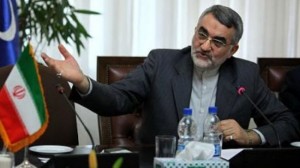 Iranian MP Alaeddin Boroujerdi[/caption]
Iranian MP Alaeddin Boroujerdi[/caption]A senior Iranian lawmaker has described the moves by pro-Israeli lobbies in the United States as the main threat to the implementation of the landmark interim deal clinched between the Islamic Republic and six major world powers over Tehran�s nuclear energy program last November.
�We are witnessing that the efforts of this lobby in the US Congress have led to the introduction of a new sanctions bill against Iran. Nevertheless, the first stage of the Geneva nuclear agreement has been implemented, and we should wait for the second phase,� Chairman of the Majlis National Security and Foreign Policy Committee Alaeddin Boroujerdi said on Monday.
He added, �The Islamic Republic of Iran has shown at the international arena that it stands by its commitments. If the [US] Congress enters the phase of new sanctions, Geneva agreement will be brought to an end. Therefore, [the United States of] America will be the biggest loser in case of any mistake by the Congress.�
Fifty-nine of 100 US Senators have signed on to a bill that would exert more pressure on Iran over its civilian nuclear activities. The American Israel Public Affairs Committee (AIPAC) has reportedly been working to convince more senators to back the measure.
The bill proposes boycotting Iranian oil exports within a year and the blacklisting of Iran's mining, engineering and construction industries.
US President Barack Obama said in a statement on Sunday that he would veto any legislation enacting new sanctions against the Islamic Republic.
"Imposing additional sanctions now will only risk derailing our efforts to resolve this issue peacefully, and I will veto any legislation enacting new sanctions during the negotiation,� he stated.
It is still unclear whether backers can put together the two-thirds majority in the 100-member Senate needed to override a veto by Obama.
On Sunday, Iran and the six world powers �� the US, France, Britain, Russia, China, and Germany -- agreed to implement the interim nuclear deal, which the two sides struck in the Swiss city of Geneva on November 24, 2013, from January 20.
Under the Geneva deal, the six countries undertook to provide Iran with some sanctions relief in exchange for Iran agreeing to limit certain aspects of its nuclear activities during a six-month period. It was also agreed that no nuclear-related sanctions would be imposed on Iran within the same timeframe.
By Press TV
The Iran Project is not responsible for the content of quoted articles.










